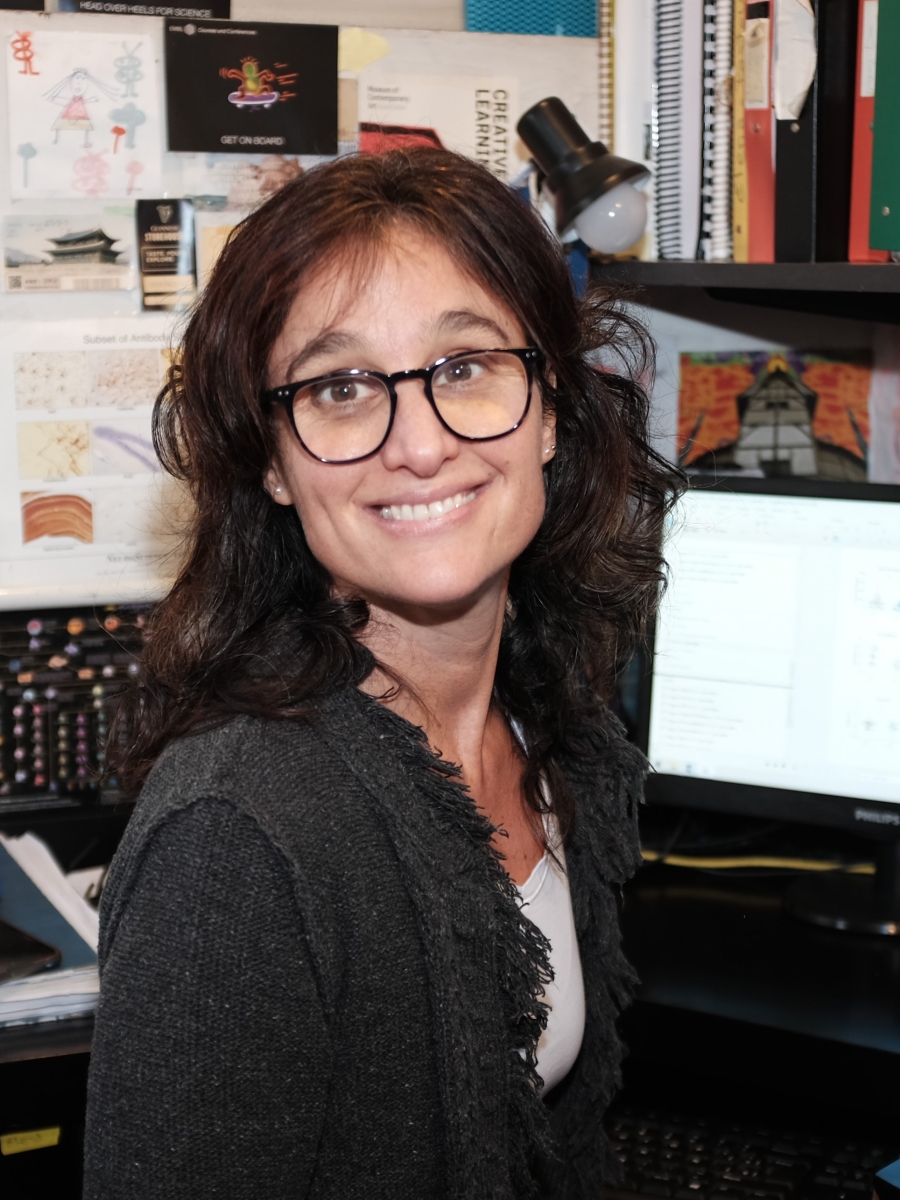Neurodegenerative diseases can be caused by multiple genetic or epigenetic factors that lead to the dysfunction and death of certain neurons in specific brain structures. There are no effective therapies to prevent or stop neuronal degeneration processes. The available treatments are only symptomatic and of moderate efficacy. One of the main challenges of current neuroscience is to elucidate the molecular mechanisms that underlie neuronal death and to develop potential repair strategies.
Our lab investigates the of use molecular tools to modify the expression or post-transcriptional processing of certain candidate genes involved in neurodegenerative processes, in order to understand their function and develop possible therapeutic strategies for these neurological diseases.
Lab Members
Carolina Facal
Ph.D. student 2020-2024
Fellow CONICET
Indiana Páez Paz
Ph.D. student
Fellow CONICET
Clara Gaguine
Ph.D. student
Fellow CONICET
Ramiro Clerici
Ph.D. student
Fellow CONICET
Nahuel Fonseca
Ph.D. student
Fellow CONICET
Irina Sapollnik
Student FCEN-UBA

Publications
Tau reduction with artificial microRNAs modulates neuronal physiology and improves tauopathy phenotypes in mice.
Facal CL, Fernández Bessone I, Muñiz JA, Pereyra AE, Pedroncini O, Páez-Paz I, Clerici-Delville R, Arnaiz C, Urrutia L, Falasco G, Argañaraz CV, Saez T, Marin-Burgin A, Soiza-Reilly M, Falzone T, Avale ME.
Molecular Therapy 2024 Apr 3;32(4):1080-1095. doi: 10.1016/j.ymthe.2024.01.033. PMID: 38310353. 2024.
SMaRT modulation of tau isoforms rescues cognitive and motor impairments in a preclinical model of tauopathy.
Muñiz J, Facal CL, Urrutia L, Delville RC, Damianich A, Ferrario JE, Falasco G and Avale ME.
Front. Bioengeneering and Biotechnology (IF=5.9). 10:951384. doi: 10.3389/fbioe.2022.951384. 2022.
Partial Ablation of Postsynaptic Dopamine D2 Receptors in the Central Nucleus of the Amygdala Increases Risk Avoidance in Exploratory Tasks.
Casey E, Avale ME, Kravitz A, Rubinstein M.
eNeuro. 2022 Mar 15;9(2):ENEURO.0528-21.2022. doi: 10.1523/ENEURO.0528-21.2022. PMID: 35210287; PMCID: PMC8925651.
Tau mis-splicing correlates with motor impairments and striatal dysfunction in a model of tauopathy.
Damianich A, Facal CL, Muñiz JA, Mininni C, Soiza-Reilly M, Ponce De León M, Urrutia L, Falasco G, Ferrario JE, Avale ME.
Brain. 2021 Jun 1: awab130. doi: 10.1093/brain/awab130. PMID: 34059893
Fyn knockdown prevents levodopa-induced dyskinesia in a mouse model of Parkinson’s disease.
Bordone MP, Damianich A, Bernardi MA, Eidelman T, Sanz-Blasco S, Gershanik OS, Avale ME, Ferrario JE.
eNeuro. 2021 Jun 7;8(4):ENEURO.0559-20.2021. doi: 10.1523/ENEURO.0559-20.2021.
Modulation of Tau Isoforms Imbalance Precludes Tau Pathology and Cognitive Decline in a Mouse Model of Tauopathy.
Espíndola SL, Damianich A, Alvarez RJ, Sartor M, Belforte JE, Ferrario JE, Gallo JM, Avale ME.
Cell Rep. 2018 Apr 17;23(3):709-715. doi: 10.1016/j.celrep.2018.03.079.
The kinase Fyn mediates L-DOPA induced dyskinesia in animal models of Parkinson’s Disease.
Sans-Blasco S, Bordone M, Saborido M, Daminaich A, Gomez G, Avale ME, Gershanik OS, Ferrario JE. 2017.
Molecular Neurobiology.
Tau isoforms imbalance impairs the axonal transport of the amyloid precursor protein (APP) in human neurons.
Lacovich V, Espindola SL, Alloatti M, Pozo Devoto V, Cromberg L, Čarná M, Forte G, Gallo JM, Bruno L, Stokin G, Avale ME*, Falzone TL*. 2017.
Journal of Neuroscience. 37:58-69. (*corresponding author)
Trans-splicing correction of tau isoform imbalance in a mouse model of tau mis-splicing.
Avale ME, Rodríguez-Martín T, Gallo JM. 2013.
Human Molecular Genetics. 22:2603-11.
Lab Projects
We study the molecular mechanisms underlying tauopathies (Alzheimer’s disease and related dementias) and Parkinson’s disease (PD). As experimental models we use transgenic mice – tauopathy or PD models- to evaluate potential molecular therapies capable of reversing degenerative processes. Additionally, we use cultured neurons to analyze neuronal survival and dysfunction, and to elucidate mechanisms related to neuronal death processes.
-Post-transcriptional regulation of tau
Our projects are mainly focused on studying the post-transcriptional processing of the MAPT gene, which codes for the microtubule-associated protein tau, and evaluating the functional consequences in models of neurodegeneration.
The Tau protein is expressed mainly in neurons, and under normal conditions it participates in the stabilization of microtubules and in axonal transport. Alzheimer’s disease (AD) and other similar neurodegenerative diseases are classified within the group of tauopathies, due to the abnormal accumulation of Tau protein in the brain of affected patients. In our laboratory, we optimized the use of a molecular strategy to correct defects due to abnormal Tau splicing, through the expression of heterologous RNA fragments capable of coupling with the endogenous messenger and generating a functional RNA chimera (Avale et al., 2013). This strategy allowed us to study the consequences of the imbalance of tau isoforms on axonal transport mechanisms in human neurons (Lacovich et al., 2017), the effects on the development of cognitive deficits in a murine model of taupatia (Espindola et al., 2018 ) and motor deficits related to parkinsonism (Damianich et al 2021). We also optimized the trans-splicing intervention for phenotypic rescue in a preclinical model (Muñiz et al 2022).
We are currently also evaluating the functional consequences of Tau post-transcriptional silencing, developing new tools based on artificially designed microRNAs.
-Predictive phenotypes and environmental effects in the development of taupaties
We investigate early phenotypes (biochemical, behavioral or sensory), which may be predictive of neurodegenerative processes associated with dysfunctions in tau and/or other target molecules, as well as environmental modifications that may impact on the development of Tau pathology.
We study how certain conditions can affect the pathological accumulation of tau and impact the manifestation of early or late phenotypes in models of tauopathy (sleep disorders, olfactory function, drugs, diet).
-Translational research
Our laboratory is part of the Argentine Consortium for Translational Research in Primary Taupathies (https://ingebi-conicet.gov.ar/caitaup/) whose objective is to generate a repository of clinical, genetic, molecular and histopathological data of patients with Progressive Supranuclear Palsy (PSP) and corticobasal degeneration (CBD) in Argentina.
Positions available
If you fancy joining us for an internship, PhD or postdoctoral training send you CV to tepnlab@gmail.com
Grants
PIP-2021-2023
FONCyT-Proyectos de Investigación Científica y Tecnológica (PICT A) 2022
2023-2027: Gene expression and RNA processing in human disease – Funded by Argentina Ministry of Science “Redes de Alto Impacto”. Role: PI
2023-2024 Ataxia UK pilot grants (Colaborator). Title: Evaluation of RNA trans-splicing as a therapeutic strategy for spinocerebellar ataxia.
GWAS analysis in Argentinean patients with atypical parkinsonism. Michael J Fox Foundation (GP2 program) MJFF-026252
Previous grants:
FONCyT-Proyectos de Investigación Científica y Tecnológica (PICT A) 2020
FONCyT-Proyectos de Investigación Científica y Tecnológica (PICT A) 2018
International Brain Research Organization (IBRO Return Home Fellowship)
International Society for Neurochemistry (IR- CAEN grant 2014)
Agencia Nacional de Promoción Científica (IR-PICT 2013)
Michael J. Fox Foundation for Parkinson’s Research (Colaborador -Target validation program 2014-IR: Dr Oscar Gershanik-ININFA-CONICET)
Cure PSP Venture grant (202-2022)
PICT 2021 CAT-II-00061-FONCYT-Argentina (salto institucional INGEBI-Rol: miembro GR) “Estudios interdisciplinarios con Enfoque UNA SALUD”: FONCyT-Proyectos de Investigación Científica y Tecnológica (PICT A) 2018

- Investigadora Independiente CONICET.
- Profesora Adjunta interina FBMC, FCEyN-UBA
- Antecedentes
- 1999. Licenciada en Ciencias Biológicas , Facultad de Ciencias Exactas y Naturales, Universidad de Buenos Aires.
- 2004. Doctora en Ciencias Biológicas, Facultad de Ciencias Exactas y Naturales, Universidad de Buenos Aires.
- 2005 – 2008. Postdoctorado en Instituto Pasteur de Paris, Francia.
- 2009 – 2012. Postdoctorado en King’s College London, Reino Unido.
- 2010 – 2012. Master (PGCAP) en Educación Superior, King’s College London, Reino Unido.
- 2013 – 2019. Investigadora Adjunta CONICET.
- 2016 – 2024. Jefa de Trabajos Prácticos, Facultad de Ciencias Exactas y Naturales, Universidad de Buenos Aires.
- 2019 – actualidad. Investigadora Independiente CONICET.
- 2024 – actualidad. Profesora Adjunta interina FBMC, Facultad de Ciencias Exactas y Naturales, Universidad de Buenos Aires.
